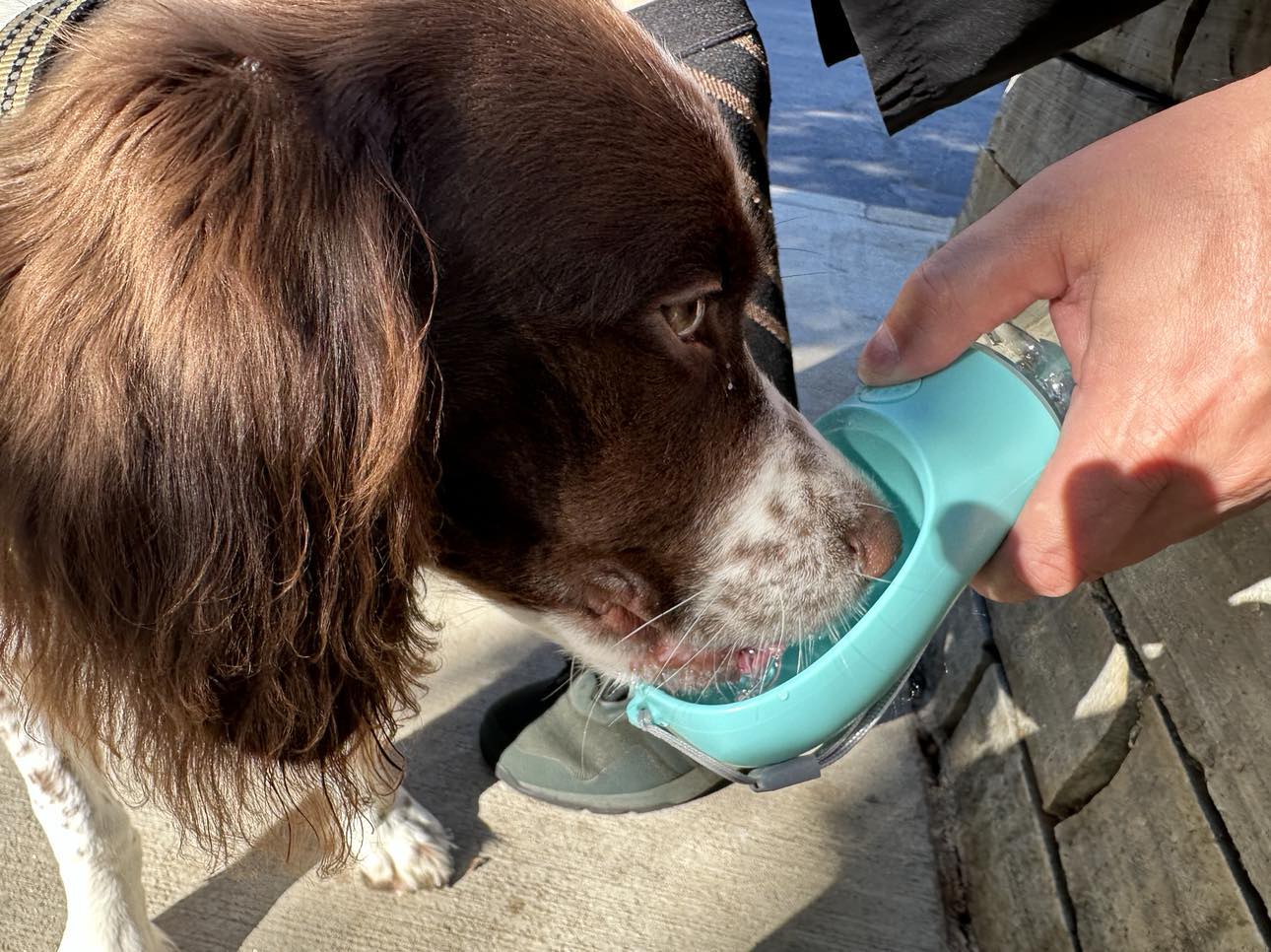The gut-brain connection, also known as the gut-brain axis, is a fascinating and crucial aspect of canine health. It refers to the bidirectional communication system between the gut and the brain in dogs, where the two organs influence and interact with each other. This connection plays a vital role in maintaining the overall well-being and balance of our canine companions.
A healthy gut is essential for your dog’s overall health and well-being. The gut, or gastrointestinal system, is responsible for digesting food, absorbing nutrients, and eliminating waste. It also houses a complex ecosystem of microorganisms known as the gut microbiome, which plays a significant role in your dog’s health.
A well-balanced gut microbiome supports a strong immune system, aids in proper digestion, and helps regulate metabolism. Additionally, it impacts various physiological functions, including hormone regulation and neurotransmitter production, which can influence your dog’s behavior and mood.
Throughout this article, we will explore the intricate relationship between the gut and the brain in dogs. We will delve into the significance of a healthy gut microbiome and how it affects your dog’s overall health, behavior, and emotional well-being. We will also discuss factors that can impact the gut microbiome and provide practical tips to maintain a healthy gut for your furry friend. By the end of this article, you will have a deeper understanding of the gut-brain connection and how to promote your dog’s optimal health through a balanced gut.
Understanding the Gut-Brain Connection
The gut-brain connection in dogs refers to the complex and intricate communication network between the gastrointestinal system (the gut) and the brain. This bidirectional relationship enables constant communication and interaction between the gut and the brain, influencing various physiological and psychological processes in our canine companions.
The gut-brain axis plays a crucial role in maintaining homeostasis and overall health. It involves the transmission of signals, such as hormones, neurotransmitters, and immune molecules, between the gut and the brain. These signals have a significant impact on your dog’s digestion, metabolism, immune responses, and emotional well-being.
At the heart of the gut-brain connection lies the gut microbiome, a diverse and complex community of microorganisms residing in the gastrointestinal tract. The gut microbiome consists of trillions of bacteria, viruses, fungi, and other microbes, collectively working as a symbiotic ecosystem.
This gut microbiome plays a pivotal role in regulating brain function and behavior through various mechanisms. It produces and interacts with neurotransmitters, such as serotonin and dopamine, which are essential for mood regulation. Additionally, the gut microbiome influences the production of gamma-aminobutyric acid (GABA), a neurotransmitter known for its calming and relaxing effects.
Furthermore, the gut microbiome helps maintain the integrity of the gut lining, preventing the leakage of harmful substances into the bloodstream. A compromised gut barrier, often referred to as “leaky gut,” can lead to inflammation and immune system dysregulation, potentially affecting your dog’s behavior, mood, and overall health.
In summary, the gut-brain connection in dogs is a vital mechanism that involves the gut microbiome’s influence on brain function and behavior. A well-balanced and diverse gut microbiome can positively impact your dog’s emotional well-being, cognitive function, and overall health. Understanding this connection is crucial for implementing strategies to promote a healthy gut and support your canine companion’s overall well-being.
The Gut Microbiome in Dogs
Understanding the Gut Microbiome and its Development in Dogs
The gut microbiome refers to the vast and diverse community of microorganisms that reside in the gastrointestinal tract of dogs. It is a complex ecosystem consisting of bacteria, viruses, fungi, and other microbes that play a crucial role in your dog’s health and well-being.
The development of the gut microbiome begins early in a dog’s life. Newborn puppies inherit their first microbes from their mother during birth, and subsequent exposure to the environment further shapes their gut microbiome. The type of diet a puppy receives, whether from nursing or early solid food introduction, also plays a significant role in shaping the composition of their gut microbiome.
As puppies grow and mature, their gut microbiome continues to evolve, influenced by various factors such as diet, environment, and exposure to other animals and humans. A healthy gut microbiome is characterized by a diverse array of microorganisms working in harmony to support digestion, nutrient absorption, and immune function.
Diversity and Composition of the Gut Microbiome in Healthy Dogs
A healthy gut microbiome in dogs is characterized by a balanced and diverse composition of microorganisms. Each dog’s gut microbiome is unique, and the specific combination of microbes can vary based on factors such as breed, age, diet, and environment.
In healthy dogs, beneficial bacteria, such as Lactobacillus and Bifidobacterium, dominate the gut microbiome. These bacteria aid in breaking down dietary fibers, producing essential nutrients, and protecting against harmful pathogens. Additionally, a diverse gut microbiome is associated with better overall health and improved resilience to stressors.
However, various factors, such as a poor diet, stress, antibiotics, or illness, can disrupt the balance of the gut microbiome, leading to dysbiosis—a condition characterized by an imbalance of beneficial and harmful microbes. Dysbiosis can contribute to gastrointestinal issues, weakened immune responses, and potential behavioral changes in dogs.
Understanding the importance of a diverse and balanced gut microbiome is essential for promoting your dog’s overall health and well-being. By providing a nutritious diet, minimizing stress, and ensuring a supportive environment, you can help maintain a healthy gut microbiome in your canine companion and positively influence their gut-brain connection.
How a Healthy Gut Impacts Your Dog’s Health
The Relationship Between a Healthy Gut and a Strong Immune System in Dogs
A healthy gut plays a critical role in supporting your dog’s immune system. The gut microbiome acts as a barrier against harmful pathogens, helping to prevent infections and diseases. Beneficial bacteria in the gut help to regulate the immune response, ensuring that it targets harmful invaders while maintaining tolerance to harmless substances.
A balanced and diverse gut microbiome contributes to a robust immune system, enabling your dog to better defend against infections and illnesses. On the other hand, an imbalanced or compromised gut microbiome can weaken the immune system, making your dog more susceptible to infections and increasing their vulnerability to various health issues.
How a Balanced Gut Microbiome Contributes to Better Digestion and Nutrient Absorption
The gut microbiome is essential for proper digestion and nutrient absorption in dogs. Beneficial bacteria aid in breaking down complex food components, such as dietary fibers and carbohydrates, that the dog’s own digestive enzymes cannot fully digest. This breakdown of nutrients enables better absorption of essential vitamins, minerals, and nutrients, supporting your dog’s overall health and vitality.
When the gut microbiome is imbalanced, it can lead to digestive issues such as bloating, gas, and diarrhea, as well as nutrient deficiencies. A healthy gut microbiome promotes efficient digestion and nutrient absorption, reducing the likelihood of gastrointestinal discomfort and ensuring your dog receives the necessary nutrients for optimal health.
The Impact of Gut Health on Skin and Coat Condition in Dogs
Surprisingly, the gut health of dogs also has a significant impact on their skin and coat condition. An imbalanced gut microbiome can contribute to skin inflammation and allergies, leading to itchiness, redness, and excessive shedding. The gut-brain connection further intensifies this link, as stress and anxiety can trigger skin issues in dogs with a compromised gut.
In contrast, a well-balanced gut microbiome can help reduce skin inflammation and improve the condition of your dog’s coat. Beneficial bacteria in the gut support the production of essential fatty acids and vitamins that nourish the skin and promote a healthy, shiny coat.
Overall, maintaining a healthy gut is vital for your dog’s immune system, digestion, nutrient absorption, and skin and coat health. By prioritizing your dog’s gut health through a nutritious diet, stress management, and proper hygiene, you can positively influence their overall well-being and foster a stronger gut-brain connection for a happier and healthier canine companion.
The Influence of Gut Health on Canine Behavior
The Gut-Brain Axis and Its Effect on Dogs’ Behavior and Mood
The gut-brain axis is a bidirectional communication system that connects the gut and the brain. It enables constant communication between the gut microbiome and the central nervous system, allowing both systems to influence each other. This gut-brain connection plays a vital role in regulating dogs’ behavior and mood.
The gut microbiome produces various neuroactive compounds and neurotransmitters that can impact brain function and behavior. For example, serotonin, often referred to as the “happiness hormone,” is largely produced in the gut. A balanced gut microbiome supports the production of serotonin, which helps regulate mood, reduce anxiety, and promote a sense of well-being in dogs.
Furthermore, the gut-brain axis can influence dogs’ stress response. Stress and anxiety can lead to changes in gut motility, causing digestive upset. Conversely, chronic gastrointestinal issues or a disrupted gut microbiome can trigger stress and anxiety in dogs. This bidirectional relationship emphasizes the importance of maintaining a healthy gut to support positive behavioral responses in dogs.
The Link Between Gut Health and Anxiety, Stress, and Other Behavioral Issues in Dogs
A balanced gut microbiome is crucial in managing anxiety and stress in dogs. Studies have shown that dogs with imbalanced gut microbiomes are more prone to anxious behaviors, such as excessive barking, pacing, and destructive chewing when left alone. Anxious dogs may also exhibit avoidance behaviors or aggression in response to stressful situations.
Conversely, a healthy gut can help dogs cope better with stressful events and reduce anxiety-related behaviors. The presence of beneficial bacteria in the gut supports the production of calming neurotransmitters, which can help dogs maintain a calmer disposition and respond more positively to various stimuli.
Moreover, addressing gut health is essential in addressing certain behavioral issues in dogs. For example, dogs with chronic gastrointestinal problems may exhibit irritability or reluctance to engage in activities due to discomfort. By addressing gut health through appropriate diet and supplementation, these behavioral issues can often be alleviated or improved.
Overall, understanding the influence of gut health on canine behavior is crucial for promoting a balanced and happy disposition in dogs. By prioritizing your dog’s gut health through proper nutrition, stress management, and regular veterinary check-ups, you can positively impact their behavior and create a calmer and more contented canine companion.
Factors Affecting the Gut Microbiome in Dogs
Disruptors of the Gut Microbiome: Diet Changes and Medications
The gut microbiome in dogs is a delicate ecosystem that can be easily influenced by various factors, including diet changes and medications. Abrupt changes in a dog’s diet, such as switching to a different brand of food or introducing new ingredients, can disrupt the balance of beneficial bacteria in the gut. This disruption can lead to gastrointestinal upset, including diarrhea and vomiting.
Additionally, certain medications, such as antibiotics, can have a significant impact on the gut microbiome. While antibiotics are essential for treating bacterial infections, they can also indiscriminately kill both harmful and beneficial bacteria in the gut. This disruption can result in an imbalance of the gut microbiome, making the dog more susceptible to gastrointestinal issues and compromising their overall gut health.
The Importance of Maintaining a Balanced Diet to Support Gut Health
Maintaining a balanced and nutritious diet is essential for supporting a healthy gut microbiome in dogs. A diet rich in high-quality protein, fiber, and prebiotics promotes the growth of beneficial bacteria in the gut. Prebiotics are non-digestible compounds that serve as food for beneficial bacteria, helping them thrive and maintain a diverse and balanced gut microbiome.
Fiber, found in vegetables and whole grains, is particularly beneficial for gut health as it aids in digestion and helps regulate bowel movements. Additionally, fermented foods like yogurt or kefir contain probiotics, which are live beneficial bacteria that can be beneficial for gut health when incorporated into the dog’s diet.
It is essential to choose a dog food that is specifically formulated to support gut health and contains natural prebiotics and probiotics. Always introduce any diet changes gradually, giving the gut time to adjust and maintain its balance of beneficial bacteria.
In conclusion, recognizing the factors that can disrupt the gut microbiome, such as sudden diet changes and certain medications, is crucial in maintaining a healthy gut in dogs. Providing a balanced and nutritious diet with prebiotics and probiotics can support a diverse gut microbiome and promote better digestion, nutrient absorption, and overall well-being for your canine companion.
Signs of an Imbalanced Gut in Dogs
Identifying Common Symptoms of an Imbalanced Gut
An imbalanced gut in dogs can manifest through various signs and symptoms. As a responsible dog owner, it is essential to be vigilant and recognize potential indicators of gut-related health issues. Some common symptoms of an imbalanced gut in dogs include:
- Digestive Upset: Persistent diarrhea, vomiting, or constipation can be signs of gastrointestinal distress and an imbalanced gut.
- Bad Breath: Foul-smelling breath, often referred to as halitosis, can be an indication of digestive issues and an imbalance in the gut microbiome.
- Excessive Flatulence: Frequent or excessive gas can be a result of an imbalanced gut and poor digestion.
- Changes in Appetite: A sudden loss of appetite or increased hunger may be linked to gut health issues in dogs.
- Skin Problems: Skin conditions such as itching, redness, or recurrent hot spots can sometimes be connected to gut health and immune system function.
- Weight Fluctuations: Unexplained weight loss or gain can be associated with an imbalanced gut impacting nutrient absorption and metabolism.
- Behavioral Changes: Anxiety, restlessness, irritability, and unusual aggression can be linked to an imbalanced gut-brain connection.
Recognizing if Your Dog May Be Experiencing Gut-Related Health Issues
As a dog owner, it is crucial to be observant and proactive in identifying any changes in your dog’s behavior or health. If you notice any of the aforementioned symptoms or other unusual behaviors, it is essential to seek veterinary advice promptly.
Your veterinarian will perform a thorough examination, including evaluating your dog’s gut health, to determine if any imbalances or underlying health issues exist. They may recommend diagnostic tests to assess the gut microbiome and rule out any potential infections or diseases affecting the gastrointestinal system.
In some cases, the vet may suggest dietary changes, supplementation, or probiotics to help restore a balanced gut microbiome. If necessary, they may also prescribe medications to address specific gut-related health issues.
By recognizing the signs of an imbalanced gut in dogs and seeking timely veterinary care, you can ensure that your canine companion receives the necessary support and treatment to promote a healthy gut-brain connection and overall well-being. Remember that pet insurance can provide financial assistance during unexpected health issues, making it a valuable resource in providing comprehensive care for your furry friend.
Maintaining a Healthy Gut in Dogs
Promoting a Healthy Gut with Probiotics and Prebiotics
Probiotics are live beneficial bacteria that can help restore and maintain a healthy balance of microorganisms in your dog’s gut. Incorporating probiotics into your dog’s diet can support digestive health and strengthen the gut-brain connection. Look for high-quality probiotic supplements specifically formulated for dogs or choose dog foods that contain natural sources of probiotics.
Prebiotics, on the other hand, are non-digestible fibers that serve as nourishment for the beneficial bacteria in the gut. Including prebiotics in your dog’s diet can help enhance the effectiveness of probiotics and promote a thriving gut microbiome. Common sources of prebiotics in dog food include chicory root, garlic, and bananas.
When introducing probiotics or prebiotics to your dog’s diet, it’s essential to do so gradually, as sudden changes can sometimes lead to digestive upset. Consult with your veterinarian to determine the appropriate dosage and ensure the chosen supplements are safe and suitable for your dog’s individual needs.
The Role of Proper Diet, Exercise, and Stress Management
A balanced and nutritious diet is a cornerstone of maintaining a healthy gut in dogs. Ensure that your dog’s food is high-quality and contains essential nutrients to support their overall health, including their gastrointestinal system. Avoid sudden changes in their diet and opt for a consistent feeding schedule.
Regular exercise is not only essential for your dog’s physical well-being but also contributes to their mental health and gut health. Engaging in daily physical activities can reduce stress levels and help regulate bowel movements, promoting a healthy gut.
Stress can negatively impact your dog’s gut health and overall well-being. Implementing stress management techniques can play a significant role in maintaining a healthy gut-brain connection. Create a calm and soothing environment for your dog, provide sufficient mental stimulation through interactive play, and ensure they receive enough rest and relaxation.
Additionally, regular veterinary check-ups are crucial to monitor your dog’s gut health and overall condition. Your veterinarian can provide personalized advice on maintaining your dog’s gut health, recommend suitable dietary options, and address any potential health concerns.
By incorporating probiotics and prebiotics into your dog’s diet, providing proper nutrition, regular exercise, and effective stress management, you can take proactive steps to support a healthy gut in your canine companion. Remember that maintaining a healthy gut not only improves digestion but also enhances their overall health and happiness, making it a fundamental aspect of responsible pet care. With the added support of pet insurance, you can ensure that your dog receives the best possible care and attention for their gut health and other health needs throughout their life.
Seeking Veterinary Advice for Gut Health
The Importance of Consulting a Veterinarian for Gut-Related Health Concerns
When it comes to your dog’s gut health, seeking advice from a qualified veterinarian is crucial. While you can take proactive measures to promote a healthy gut, professional guidance is essential for identifying and addressing any existing gut-related health concerns. Veterinarians possess the expertise and knowledge to assess your dog’s overall health, conduct thorough examinations, and provide tailored recommendations for maintaining optimal gut function.
If you notice any signs of an imbalanced gut or suspect gut-related issues in your dog, such as chronic diarrhea, vomiting, excessive gas, or changes in appetite, it’s vital to schedule a veterinary appointment promptly. Early detection and intervention can prevent potential complications and discomfort for your furry companion.
Diagnostic Tests and Treatments for Gut-Related Issues in Dogs
Upon your veterinary visit, your veterinarian will conduct a comprehensive examination and may recommend specific diagnostic tests to assess your dog’s gut health accurately. Some common diagnostic tests may include fecal analysis, blood tests, and imaging studies to identify any underlying gastrointestinal conditions.
Based on the findings, your veterinarian will determine the most appropriate course of action for treating gut-related issues. Treatment plans can vary depending on the diagnosis, and may include the use of medications, dietary adjustments, or the incorporation of probiotics and prebiotics to restore gut balance.
In some cases, your veterinarian may recommend an elimination diet to identify potential food sensitivities or allergies that could be affecting your dog’s gut health. This involves carefully removing certain food ingredients from your dog’s diet and gradually reintroducing them to identify any adverse reactions.
In severe cases or when other treatments are ineffective, your veterinarian may refer you to a board-certified veterinary specialist, such as a veterinary gastroenterologist, to provide specialized care and advanced treatments.
Remember that every dog is unique, and gut-related health issues can have various underlying causes. A veterinarian’s expertise is invaluable in accurately diagnosing and treating gut-related problems, ensuring your dog receives the most appropriate and effective care for their specific needs.
Conclusion
In conclusion, the gut-brain connection plays a crucial role in your dog’s overall health and well-being. A healthy gut is not only essential for proper digestion and nutrient absorption but also influences your dog’s behavior, mood, and immune function. When the gut microbiome is balanced, it promotes a strong immune system, healthier skin and coat, and better emotional resilience.
The gut-brain axis allows for constant communication between the gut and the brain, impacting your dog’s cognitive and emotional responses. An imbalanced gut can lead to a range of health issues, including gastrointestinal problems, anxiety, and stress-related behaviors.
As responsible dog owners, it is crucial to prioritize your dog’s gut health through proper nutrition and regular veterinary care. Providing a well-balanced diet that supports a healthy gut microbiome, including the use of probiotics and prebiotics, can be beneficial for your dog’s overall health.
Regular veterinary check-ups and consultations are essential for early detection and intervention in case of any gut-related issues. If you observe signs of an imbalanced gut or any unusual behaviors, seeking professional advice from a veterinarian is the best course of action.
Remember that every dog is unique, and their gut health may require individualized attention. By staying proactive in promoting gut health, you can ensure that your canine companion leads a happier, healthier, and more fulfilling life.
In caring for your dog’s gut health, you not only enhance their overall well-being but also strengthen the bond between you and your furry friend. As a devoted dog owner, you play a vital role in ensuring your dog’s health and happiness, and by prioritizing their gut health, you are giving them the best chance at living a long and joyful life.
With a well-maintained gut-brain connection, your dog can thrive and be the vibrant, energetic, and affectionate companion you cherish every day. Make gut health a priority, and enjoy the journey of watching your beloved canine companion live their best life!










